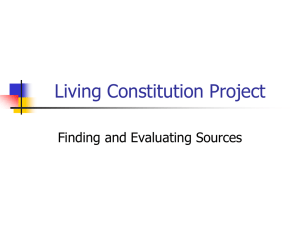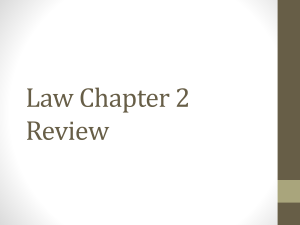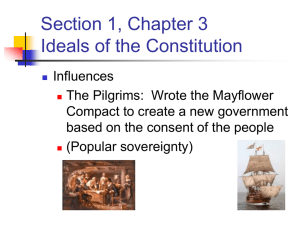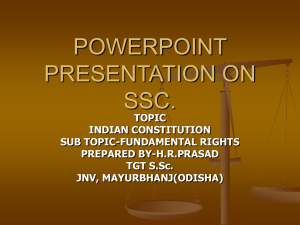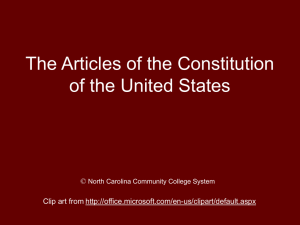Federalist Paper
advertisement
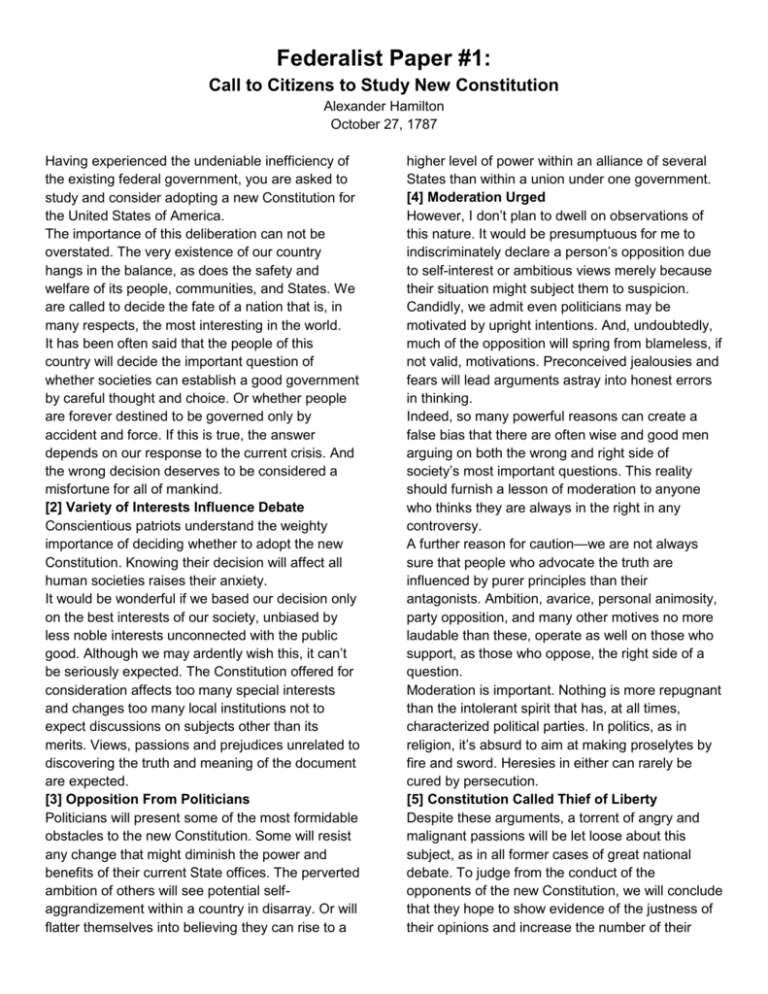
Federalist Paper #1: Call to Citizens to Study New Constitution Alexander Hamilton October 27, 1787 Having experienced the undeniable inefficiency of the existing federal government, you are asked to study and consider adopting a new Constitution for the United States of America. The importance of this deliberation can not be overstated. The very existence of our country hangs in the balance, as does the safety and welfare of its people, communities, and States. We are called to decide the fate of a nation that is, in many respects, the most interesting in the world. It has been often said that the people of this country will decide the important question of whether societies can establish a good government by careful thought and choice. Or whether people are forever destined to be governed only by accident and force. If this is true, the answer depends on our response to the current crisis. And the wrong decision deserves to be considered a misfortune for all of mankind. [2] Variety of Interests Influence Debate Conscientious patriots understand the weighty importance of deciding whether to adopt the new Constitution. Knowing their decision will affect all human societies raises their anxiety. It would be wonderful if we based our decision only on the best interests of our society, unbiased by less noble interests unconnected with the public good. Although we may ardently wish this, it can’t be seriously expected. The Constitution offered for consideration affects too many special interests and changes too many local institutions not to expect discussions on subjects other than its merits. Views, passions and prejudices unrelated to discovering the truth and meaning of the document are expected. [3] Opposition From Politicians Politicians will present some of the most formidable obstacles to the new Constitution. Some will resist any change that might diminish the power and benefits of their current State offices. The perverted ambition of others will see potential selfaggrandizement within a country in disarray. Or will flatter themselves into believing they can rise to a higher level of power within an alliance of several States than within a union under one government. [4] Moderation Urged However, I don’t plan to dwell on observations of this nature. It would be presumptuous for me to indiscriminately declare a person’s opposition due to self-interest or ambitious views merely because their situation might subject them to suspicion. Candidly, we admit even politicians may be motivated by upright intentions. And, undoubtedly, much of the opposition will spring from blameless, if not valid, motivations. Preconceived jealousies and fears will lead arguments astray into honest errors in thinking. Indeed, so many powerful reasons can create a false bias that there are often wise and good men arguing on both the wrong and right side of society’s most important questions. This reality should furnish a lesson of moderation to anyone who thinks they are always in the right in any controversy. A further reason for caution—we are not always sure that people who advocate the truth are influenced by purer principles than their antagonists. Ambition, avarice, personal animosity, party opposition, and many other motives no more laudable than these, operate as well on those who support, as those who oppose, the right side of a question. Moderation is important. Nothing is more repugnant than the intolerant spirit that has, at all times, characterized political parties. In politics, as in religion, it’s absurd to aim at making proselytes by fire and sword. Heresies in either can rarely be cured by persecution. [5] Constitution Called Thief of Liberty Despite these arguments, a torrent of angry and malignant passions will be let loose about this subject, as in all former cases of great national debate. To judge from the conduct of the opponents of the new Constitution, we will conclude that they hope to show evidence of the justness of their opinions and increase the number of their converts by the loudness of their rhetoric and the bitterness of their denunciations. Those who argue with enlightened zeal for the energy and efficiency of government will be demonized as being fond of despotic power and hostile to liberty. When supporters profess that the rights of the people must be scrupulously protected, it will be characterized as insincere, a blatant bid for popularity at the expense of the public good. It will be forgotten that dangers to the rights of people most commonly spring from the head rather than the heart, that the noble enthusiasm of liberty is apt to be infected with narrow-minded bigotry and distrust. It will also be forgotten that a vital government is essential to secure liberty. Sound judgment shows these can never be separated. And dangerous ambition more often lurks behind the specious mask of zeal for the rights of the people than under the zeal for a firm and efficient government. History teaches us that of the men who have overturned the liberties of republics, most began their career by proclaiming their devotion to the people. They gain position by arousing people’s prejudices and end as tyrants. [6] My Support of New Constitution As I wrote the above I’ve tried, my fellow citizens, to put you on guard against all attempts, from whatever quarter, to influence you. Your decision on the new Constitution, of the highest importance to your welfare, should result from the evidence of truth. I’m sure you have noticed that I am not unfriendly to the new Constitution. Yes, my countrymen, I admit that after having given it attentive consideration, I believe it is in your interest to adopt it. I am convinced 14 that this is the safest course for your liberty, your dignity, and your happiness. I don’t pretend to have reservations I don‘t feel. I won’t amuse you with an appearance of deliberation when I have decided. I frankly acknowledge to you my convictions, and I will freely lay before you the reasons on which they are founded. The consciousness of good intentions disdains ambiguity. The new Constitution has my full and unambiguous support. I shall not, however, dwell on professions of my faith in it. And my motives must remain in my heart. My arguments will be offered in the spirit of presenting the truth. They will be open to all and may be judged by all. [7] Discussion of Constitutional Issues I propose, in a series of papers, to discuss the following interesting particulars: The usefulness of a successful federal government to the union. The insufficiency of the present Confederation to preserve the union. The necessity of a federal government at least as energetic as the one proposed in the Constitution to attain this objective. The conformity of the proposed Constitution to the true principles of republican government. Its analogy to the New York constitution. And the additional security its adoption will afford to the preservation of the republican form of government, to liberty, and to property. As this discussion progresses, I will endeavor to give satisfactory answers to objections that arise and may claim your attention. [8] Opponents: Thirteen States Too Big Arguments proving the utility of the union may be thought superfluous. The importance of the union may be seen as deeply engraved on the hearts of the people in every State, with no adversaries. But the fact is, we already hear it whispered among those who oppose the new Constitution that thirteen States are too many for any general system. They argue that we must break into several separate confederacies.∗ This doctrine will, in all probability, be gradually propagated until it has enough votes to approve it. To those who take an enlarged view of the subject, nothing is more evident than that the alternative to adoption of the new Constitution is dismemberment of the Union. Therefore, it will be useful to examine the advantages of the Union, and the probable dangers and certain evils to which every State will be exposed from its dissolution. Accordingly, this will constitute the subject of my next editorial.




